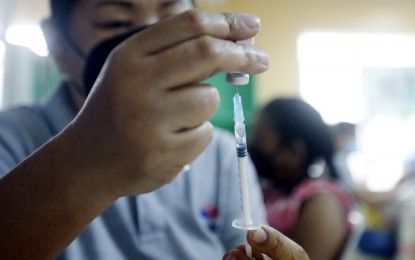
Pfizer vaccine (PNA photo by Oliver Marquez)
MANILA – The Department of Health (DOH) is still waiting for a legal basis to enter into an agreement on the donation of bivalent Covid-19 vaccines from the COVAX Facility.
In a media forum, DOH officer in charge Maria Rosario Vergeire said the agency was challenged by its legal situation as Republic Act (RA) 11525 has ceased to exist when the state of calamity due to Covid-19 was lifted.
RA 11525 or An Act Establishing the Covid-19 Vaccination Program Expediting the Vaccine Procurement and Administration Process, Providing Funds and For Other Purposes, includes the provision on indemnification and immunity from liability, which are required by vaccines manufacturers.
"We started working on this as early as February at hanggang sa ngayon wala po tayong makita pa na remedy na pwede sa ngayon dahil wala nga pong basehan ang ating gobiyerno (and until now we cannot see any possible remedy that could be a basis for our government) to enter to this kind of agreement," Vergeire said.
"The most concrete solution now that we have is our inclusion into the Center for Disease Prevention and Control bill, which hopefully could be passed in June this year, where the indemnification and immunity from liability clauses are stated, that we found also in RA 11525."
Earlier, the DOH said it is coordinating with the Office of the President and Office of the Solicitor General regarding the matter.
The DOH is still waiting for possible legal solutions so it could give an exact timeline for the arrival of the donated bivalent vaccines in the country.
"Rest assured, kausap po namin yung (we have spoken to the) COVAX Facility, they are not running away from their commitment, they said they will wait until we have enough legal basis, and they are still very much interested to donate," Vergeire said.
"Actually, ngayon may pumasok ulit na dalawang (there are two) additional countries who are still willing to donate bivalent vaccines to us."
The country is expecting some 1,002,000 million doses of Pfizer's bivalent jabs from the COVAX Facility, which were previously scheduled to arrive by the third or fourth week of March. (PNA)
